Miami AI Symposium draws faculty, staff, and students for two-day event
For the second time, the Miami AI Symposium was a successful event showcasing the best and brightest of Miami’s faculty, staff, and students and their relationship with generative artificial intelligence.
Miami AI Symposium draws faculty, staff, and students for two-day event
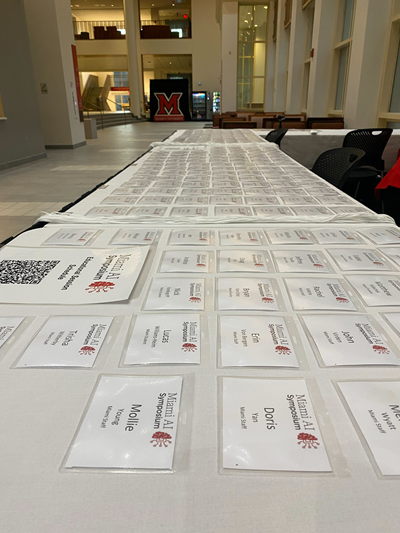
For the second time, the Miami AI Symposium was a successful event showcasing the best and brightest of Miami’s faculty, staff, and students and their relationship with generative artificial intelligence. The event took place just in time to tie into the FOCUS Theme for Miami in 2025: Artificial Intelligence: Revolutionizing Our World.
The second annual Miami AI Symposium: AI Everywhere took place over the course of two days, with sessions scheduled for every hour during business hours on Monday, March 10, and then more in the morning the next day (Tuesday, March 11). Each day of the conference was punctuated by a keynote presentation from intriguing, engaging speakers that offered viewpoints on the nature of generative artificial intelligence and its use in the business and higher education landscapes.
Close to 300 people registered for the conference, which allowed for a relaxed drop-in, drop-out schedule. There were three different educational tracks to choose from, all of which promised interesting topics from knowledgeable experts in their respective fields:
- The Ethical and Responsible Use of AI
- The Impact of AI on Education and Research
- The Practical Applications and Development of AI
Each session within these tracks drew attendees from across the University, folks from different disciplines and with different educational backgrounds. All of us gathered to learn more about the thing on everyone’s minds: generalized artificial intelligence.
Embracing AI as an enhancement to pedagogy
The symposium began with opening remarks by President Greg Crawford, who spoke about how he was looking forward to learning more about AI – and about how events like this symposium position Miami as a thought leader in this space! Then, we moved onto the featured session of the morning, with faculty from the Farmer School of Business presenting about how the AI landscape is going to change college education, for better or worse.
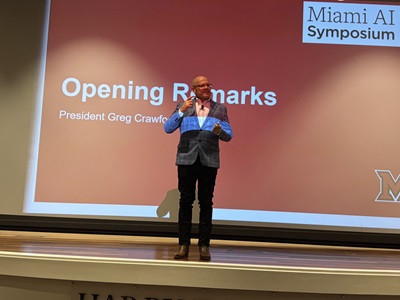
They talked about how it would be easy to just forbid students to use AI – but that’s not going to move us forward. Instead, they posited, let’s look at AI as an enabler in the classroom and in the community. Faculty can use AI to brainstorm classroom activities, enhance teaching materials, and even feed their own data to custom chatbots. Foundational skills should be learned without AI in order to build core competencies – but students can then use these tools to do the more menial tasks while they focus on higher-order thinking.
At the end of the day, they said, hiring managers are starting to look for candidates that know how to write AI prompts and synthesize the answers they get. We should embrace their capabilities and start incorporating them in our classrooms.
From discussions of the effect of AI on our language to everyday tips…
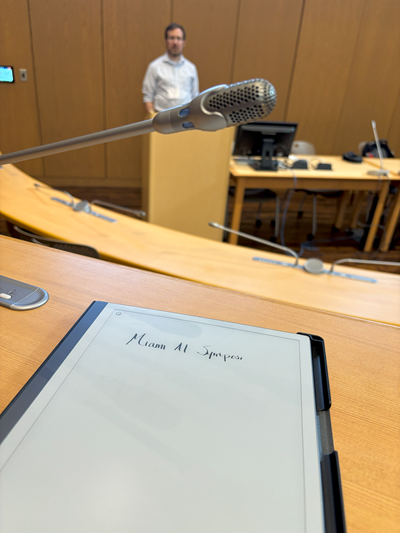
After the featured session, various educational sessions throughout the day showed how to use AI in our daily life (with Miami CIO David Seidl leading a session focusing on tips for getting these gen-AI tools to make games, or create task lists, or write alt text for images); other sessions focused on the anxiety that huge change causes and how AI in popular culture is depicted as the harbinger of that change. We even learned how you could use gen-AI to help you solve the Wordle!
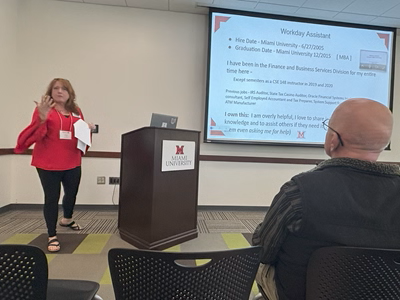
The two-day symposium was filled with these kinds of insights – a healthy balance of “how-to” presentations peppered with critical thought about how we need to adapt pedagogy in light of these new systems, approaching the subject carefully and with intention. A poster session on Monday night encouraged folks to engage with speakers showing off their research using AI tools, as well. Many of these poster presentations were orchestrated by student researchers, showing the strength of the curriculum surrounding AI.
Two keynotes, one message: AI is here to stay
The first day’s keynote presentation was given by Hod Lipson, a well-known and accomplished professor and chair of the mechanical engineering department at Columbia University. Lipson directs the Creative Machines Lab, which pioneers new ways to make machines that create, and machines that are creative. His keynote, aptly titled “The Next AI: Steer, Don’t Fear,” focused on the fact that AI is here, and we need to figure out how to point it in the right direction.
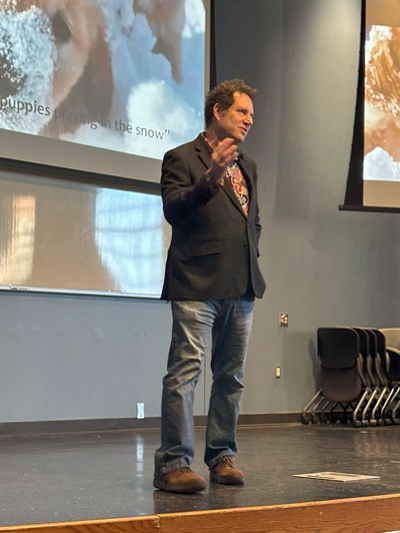
Lipson, whose Ted Talk “Building Self-Aware Robots” has more than 1.5 million views, spoke passionately about how important it is to learn more about these tools, because even if you don’t understand it, “AI is a tsunami coming our way,” and you’re going to be dragged along regardless.
“This is the worst AI is going to be,” he said, making reference to how the tools we are using now aren’t nearly as advanced as they will be in the future. “It only goes up from here.”
And, he posited, we have to understand AI before we can steer it.
The symposium was endcapped by a keynote presentation from Dr. Adam Troy, partner technical advisor at Microsoft Office AI, who punctuated his talk with advice for the various audiences in the room: instructors, students, and learners of all kinds.
His advice to students? When starting your educational journey, instead of heading specifically for a certain career or role, think about what you want to do with your life. What are you passionate about? Dr. Troy noted that he felt that this mindset set him apart from others as he was working toward his job at Microsoft.
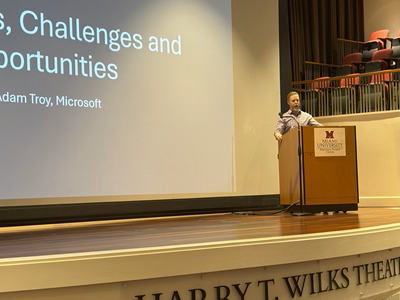
All in all, the second annual Miami AI Symposium was an event filled with critical thought, inquisitive sessions, and questions that attendees could take with them and continue thinking about for the weeks to come.
What’s next for the Miami AI Symposium?
The success of this second annual AI Symposium demonstrated that there is certainly a desire at Miami to understand, interact with, and utilize generative artificial intelligence. So, what’s next for the symposium?
“We’re already looking forward to hosting a third AI Symposium, and hope to engage with industry and external partners as well as Miami students, faculty, and staff as the event evolves,” said Seidl, who envisioned the first AI Symposium in 2023 and helped to organize this year’s event. “I continue to be extremely proud of the quality of content, community engagement, and interest in AI that we see from Miamians.”
Many thanks to the symposium planning committee for the extremely well-run and engaging event:
- Eric Bachmann
- Michael Bailey-Van Kuren
- Sarah Meaney
- Louise Morman
- David Scoville
- Jay Shan
- David Seidl
